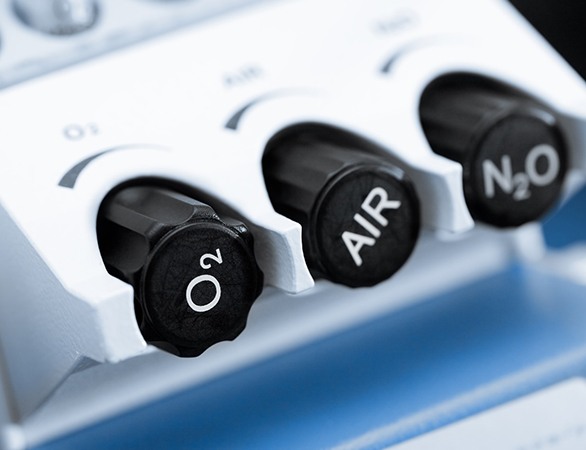
Sedation Dentist Aurora
Hate Going to the Dentist? We’ll Change Your Mind
Are you fearful of going to the dentist? We want you to know you are not alone. We have treated numerous patients with dental phobias in our dental office. We have been very pleased to help relieve their fear during their appointments through three types of sedation dentistry in our Aurora, IL dental office. Continue reading to learn more about your options. If you have any questions, don’t hesitate to contact us!
Why Choose Sommers Family Dental for Sedation Dentistry?
- Sedation Available for Any Procedure
- Gentle Enough for Children, Strong Enough for Adults
- Kind, Friendly, & Highly Experienced Team
Nitrous Oxide Sedation

Nitrous oxide is an excellent way to help ease any lingering fears, anxiety, or nervousness that you may feel about visiting your dentist in Aurora. Whether you’re someone who routinely reschedules appointments due to your dental anxiety or you’re not looking forward to undergoing a treatment that you need, our team at Sommers Family Dental can help you feel comfortable with nitrous oxide.
Who is a Good Candidate for Nitrous Oxide?

Nitrous oxide is an excellent choice for both children and adults, as it’s completely safe and perfect for those experiencing mild dental anxiety or fear. It’s also an excellent service for patients who deal with the following:
- A strong and sensitive gag reflex that makes cleanings and treatments uncomfortable.
- A fear or discomfort around needles.
- Physical or cognitive disabilities make it uncomfortable or difficult to sit in the treatment chair for the duration of your appointment.
- You’re receiving a treatment that may take a little longer than a routine checkup and cleaning.
We typically don’t administer nitrous oxide to those who are pregnant, have sinus congestion, or deal with certain respiratory conditions. Before we administer nitrous oxide, our team will gather your medical history to ensure it’s safe and that you’re a good candidate.
How Does Nitrous Oxide Work?

Nitrous oxide is administered through a small nose mask that we’ll place onto your face. Through it, you’ll breathe in the sedation, quickly allowing you to enter a calm and relaxed state. Once the full effects have taken place, your sedation dentist in Aurora will begin your treatment as our trained staff monitor you throughout your care. Once the visit is complete, we’ll have you breathe in oxygen to help flush the effects from your system and make sure you’re fine to leave.
Aftercare for Nitrous Oxide Sedation

One great benefit of nitrous oxide sedation is that its effects wear off very quickly. Many of our patients only need to stay in our office for a few minutes following their treatment before they’re cleared to drive home. Depending on the procedure you received, you may be safe to carry on with the rest of your day as you normally would, like going to work or school. Some patients experience a lingering headache or some slight nausea after sedation, but this is typical and will dissipate with some time.
Oral Conscious Sedation

For patients who suffer from moderate to severe dental anxiety, we offer oral conscious sedation, which only involves swallowing one pill about an hour before the appointment. By the time you arrive at our dental office, you’ll already feel at-ease as we direct you to your treatment room. Because the effects take a while to wear off, you’ll need to be prepared to have a trusted family member or friend drop you off and pick you up from our dental office.
What is Oral Conscious Sedation?
Oral conscious sedation involves taking a small pill before your dental appointment to help you feel deeply relaxed. Unlike nitrous oxide, which creates a light and tingly sensation, or IV sedation, which puts you fully to sleep, oral conscious sedation offers a perfect balance. Typically, you’ll take the pill about an hour before your visit, and by the time you settle into the dental chair, you’ll start feeling its calming effects.
Before beginning your treatment, we ensure you’re comfortable, relaxed, and ready. While oral conscious sedation doesn’t fully put you to sleep, many patients feel so at ease that they may drift off. If this happens, a gentle tap on the shoulder is usually enough to wake you. Because of its stronger relaxing effects, we recommend arranging for a friend or family member to drive you to and from your appointment.
The Benefits of Oral Conscious Sedation
We offer oral conscious sedation because it provides several key advantages, including:
- Convenience: Simply take a pill before your appointment for a stress-free experience. The effects wear off more quickly than IV sedation, making recovery easier.
- Effectiveness: Patients remain calm and relaxed throughout treatment. Many also appreciate that they may have little to no memory of the procedure afterward.
- Predictability: This sedation method is highly reliable. We provide you with a precise time to take the pill, ensuring a smooth and seamless appointment.
- Versatility: Whether you experience dental anxiety or simply want a more relaxing visit, oral conscious sedation is a flexible solution tailored to meet your needs.
Who is Oral Conscious Sedation Recommended For?
Oral conscious sedation is an excellent option for patients with moderate dental fear or anxiety. It strikes the perfect balance—offering stronger relaxation than nitrous oxide but without the intensity of IV sedation. This solution is ideal for individuals who prefer to mentally and physically “check out” during their dental visit.
In addition to easing anxiety, oral conscious sedation is highly effective for patients with an overactive gag reflex or difficulty keeping their jaw open during treatment. Even if you don’t typically experience dental fear, this option can be a great choice after a recent traumatic experience or if you simply want a stress-free and relaxing appointment.
IV Sedation

For people who are undergoing more complex procedures or who have extreme dental anxiety, we offer IV sedation. We will administer the medication directly into the bloodstream, causing the patient to feel immediately relaxed and at ease. Many patients who undergo IV sedation don’t remember anything about their appointment. This can be a great benefit for those who don’t want any more fearful memories of dental experiences. Read on to learn more about IV sedation, who makes and good candidate, and its benefits.
What Is IV Sedation?

IV sedation is delivered directly into the bloodstream. This means that you will feel the effects of the medication almost right away. Even though you will be fully relaxed, you will remain awake through the treatment. However, you likely won’t have many memories from your time at the dental office. During your procedure, we will keep a close eye on your vitals to ensure that you are perfectly safe. After your procedure, the effects of the medicine will take some time to wear off, so it’s important that a trusted friend or family member takes you home.
Who Is a Good Candidate for IV Sedation?

IV Sedation is mostly used for oral surgeries and long procedures. It is able to help lessen high levels of anxiety associated with dental treatment or the dental office. Additionally, IV sedation is an excellent option for people who have a sensitive gag reflex, TMJ dysfunction, and neuromuscular issues that can make it challenging to keep their mouth open throughout the duration of a dental procedure. Before your treatment begins, we will discuss your anxiety levels, health history, and medications to rule out any possibility of complications.
The Benefits of IV Sedation

A variety of benefits can be experienced through IV sedation. Here are a few of the most common ones that our patients experience:
- Quick: The effects set in very quickly because the medication is administered directly in the bloodstream.
- Constant: We control the flow of medication, giving patients a constant state of relaxation.
- Amnesia: IV sedation prevents additional stress-related memories associated with the dental office.
- Dental Care: patients with dental phobia and other issues can receive the essential dental care they need for their smiles to thrive!




